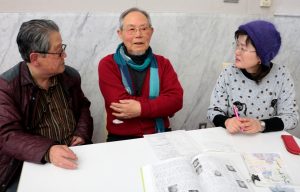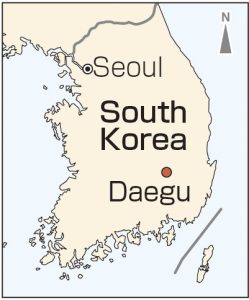Japanese A-bomb survivors to visit South Korea and form exchange group with local survivors
Apr. 1, 2019
by Miho Kuwajima, Staff Writer
Visit intends to promote handing down of A-bomb experience to next generation
Long-running efforts being made by citizens to support atomic bomb survivors living overseas will take a fresh turn with new steps to pass on the A-bomb experience of survivors to younger people and promote exchanges between Japan and South Korea. On April 19, members of the Hiroshima branch of the Association of Citizens for Supporting South Korean Atomic Bomb Victims (chaired by Etsuko Nakatani) will visit Daegu, South Korea and form an exchange group with the Daegyeong branch of the South Korean Atomic Bomb Sufferers Association. With both the South Korean A-bomb survivors and their supporters in Japan growing older, the desire of Hiroshima citizens to lend their support to survivors overseas, based on the idea that “A-bomb survivors should be treated equally wherever they live,” will be relayed to the next generation through the establishment of this new group.
“I have carried out my role in the group for more than 40 years by providing support for the lawsuits brought by the South Korean A-bomb survivors against the Japanese government and their acquisition of the Atomic Bomb Survivor’s Certificate. From this point on, I have to lay a foundation for people of the next generation who will take over this role of promoting friendship and goodwill between Japan and South Korea,” said Keisaburo Toyonaga, 83, an A-bomb survivor living in Aki Ward, Hiroshima, speaking with firm conviction.
Lee Jong-keun, 89, an A-bomb survivor who lives in Asaminami-Ward, Hiroshima, will share his experience of the atomic bombing at an exchange event in Daegu to commemorate the formation of the new exchange group. He will also talk about the painful experience of enduring dual discrimination at school and at work as an A-bomb survivor and as a Korean living in Japan. He looks forward to relating his experience, saying, “I also want to mention in my speech that I have received support from many Japanese people.”
In 1971, an association of citizens was established in Osaka to help South Koreans who experienced the atomic bombing in Japan, which had colonized the Korean Peninsula until the end of the war. In 1972, Mr. Toyonaga and others formed the Hiroshima branch of this association to lend support to South Korean survivors, who had not received relief from either the Japanese or South Korean governments, so they could come to Japan for medical treatment. When the Korean survivors launched a number of lawsuits against the Japanese government, which contended that A-bomb survivors residing outside Japan could not be covered under the scope of governmental support, the association and many lawyers gave them their full support. Through these legal challenges, they were able to influence the government and realize the outcome they had sought, enabling A-bomb survivors living overseas to apply for the Atomic Bomb Survivor’s Certificate and receive health care benefits from the Japanese government.
In 2016, it was decided that the medical expenses of the survivors overseas as well as those residing in Japan would be fully reimbursed by the government, which paved the way for rectifying the discrimination between survivors within the system. The members of the group then wished to continue providing their support and promoting exchange opportunities between Japan and South Korea, with the future of the two nations in mind.
According to the Ministry of Health, Labor, and Welfare, the number of A-bomb survivors in South Korea totals 2,241 as of the end of March 2018, declining by 687 from a decade ago. There exists the possibility their harsh experiences and memories will be buried in history without being known. Therefore, handing down their experiences to the next generation is an urgent concern.
An Kum-ju, 55, a member of the group who is originally from South Korea and now lives in Nishi Ward, Hiroshima, feels strongly about the fact that the people of South Korea aren’t very familiar with the experiences of the survivors. Ms. An said, “I would like to take this opportunity to raise people’s interest in the A-bomb experience and issues involving the survivors so we can address both of these things at the same time.”
(Originally published on April 1, 2019)
Visit intends to promote handing down of A-bomb experience to next generation
Long-running efforts being made by citizens to support atomic bomb survivors living overseas will take a fresh turn with new steps to pass on the A-bomb experience of survivors to younger people and promote exchanges between Japan and South Korea. On April 19, members of the Hiroshima branch of the Association of Citizens for Supporting South Korean Atomic Bomb Victims (chaired by Etsuko Nakatani) will visit Daegu, South Korea and form an exchange group with the Daegyeong branch of the South Korean Atomic Bomb Sufferers Association. With both the South Korean A-bomb survivors and their supporters in Japan growing older, the desire of Hiroshima citizens to lend their support to survivors overseas, based on the idea that “A-bomb survivors should be treated equally wherever they live,” will be relayed to the next generation through the establishment of this new group.
“I have carried out my role in the group for more than 40 years by providing support for the lawsuits brought by the South Korean A-bomb survivors against the Japanese government and their acquisition of the Atomic Bomb Survivor’s Certificate. From this point on, I have to lay a foundation for people of the next generation who will take over this role of promoting friendship and goodwill between Japan and South Korea,” said Keisaburo Toyonaga, 83, an A-bomb survivor living in Aki Ward, Hiroshima, speaking with firm conviction.
Lee Jong-keun, 89, an A-bomb survivor who lives in Asaminami-Ward, Hiroshima, will share his experience of the atomic bombing at an exchange event in Daegu to commemorate the formation of the new exchange group. He will also talk about the painful experience of enduring dual discrimination at school and at work as an A-bomb survivor and as a Korean living in Japan. He looks forward to relating his experience, saying, “I also want to mention in my speech that I have received support from many Japanese people.”
In 1971, an association of citizens was established in Osaka to help South Koreans who experienced the atomic bombing in Japan, which had colonized the Korean Peninsula until the end of the war. In 1972, Mr. Toyonaga and others formed the Hiroshima branch of this association to lend support to South Korean survivors, who had not received relief from either the Japanese or South Korean governments, so they could come to Japan for medical treatment. When the Korean survivors launched a number of lawsuits against the Japanese government, which contended that A-bomb survivors residing outside Japan could not be covered under the scope of governmental support, the association and many lawyers gave them their full support. Through these legal challenges, they were able to influence the government and realize the outcome they had sought, enabling A-bomb survivors living overseas to apply for the Atomic Bomb Survivor’s Certificate and receive health care benefits from the Japanese government.
In 2016, it was decided that the medical expenses of the survivors overseas as well as those residing in Japan would be fully reimbursed by the government, which paved the way for rectifying the discrimination between survivors within the system. The members of the group then wished to continue providing their support and promoting exchange opportunities between Japan and South Korea, with the future of the two nations in mind.
According to the Ministry of Health, Labor, and Welfare, the number of A-bomb survivors in South Korea totals 2,241 as of the end of March 2018, declining by 687 from a decade ago. There exists the possibility their harsh experiences and memories will be buried in history without being known. Therefore, handing down their experiences to the next generation is an urgent concern.
An Kum-ju, 55, a member of the group who is originally from South Korea and now lives in Nishi Ward, Hiroshima, feels strongly about the fact that the people of South Korea aren’t very familiar with the experiences of the survivors. Ms. An said, “I would like to take this opportunity to raise people’s interest in the A-bomb experience and issues involving the survivors so we can address both of these things at the same time.”
(Originally published on April 1, 2019)









